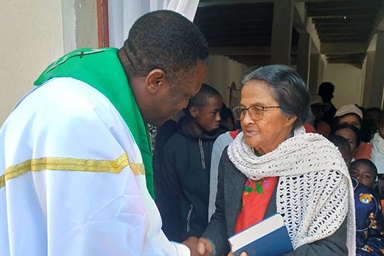Over the coming months and into next spring, the United Methodist central conferences will meet to elect new bishops.
Central conferences are United Methodist regions in Africa, Asia and Europe. While the U.S. jurisdictional conferences all met in July, the central conferences gather on varying schedules, the earliest being the Africa Central Conference in August and the latest being Germany in March 2017. Only some of the central conferences have bishop elections.
There are seven central conferences — Africa, Central and Southern Europe, Congo, Germany, Northern Europe and Eurasia, Philippines and West Africa.
They will meet as follows:
• Africa Central Conference: Aug. 11-14
• Northern Europe and Eurasia Central Conference: Oct. 19-23
• Philippines Central Conference: Nov. 28-Dec. 4
• West Africa Central Conference: Dec. 13-16
• Congo Central Conference: March 6-10, 2017
• Central and Southern Europe Central Conference: March 8-12, 2017
• Germany Central Conference: March 15-19, 2017
A total of five bishops in the central conferences are scheduled to retire:
Bishop John Innis (Liberia) in the West Africa Central; Bishops Kainda Katembo (Southern Congo), Bishop Nkulu Ntanda Ntambo (North Katanga) and Bishop David Yemba (Central Congo) from Congo Central; and Bishop Rosemarie Wenner from Germany Central.
All three bishops in the Philippines — Bishop Peter Torio (Baguio), Bishop Ciriaco Q. Francisco (Davao), Bishop Rodolfo Alfonso Juan (Manila) — will be running for re-election. Bishops in the Philippines face re-election every four years. Bishop Gabriel Yemba Unda of the Eastern Congo Episcopal Area is also running for re-election in Africa. If Unda is re-elected, he is a bishop for life. Bishop Christian Alsted, Nordic-Baltic Episcopal area, is also up for re-election to a four-year term.
The 2016 General Conference passed new legislation that mandated a central conference bishop whose 68th birthday is reached on or before the opening day of his or her scheduled conference “shall be retired at a date no later than three months following the adjournment of General Conference,” which ended May 20.
Though only Africa Central will meet within that three-month window, the new legislation did not affect any of the bishops already scheduled to retire, and did not lead to the retirement of any other active bishops.
Liberian divorce legislation
At its February 2016 annual meeting, the Liberia Conference upheld legislation banning divorced clergy from running for bishop before endorsing two episcopal candidates to send to the West Africa Central Conference for election in December 2016.
It is unclear whether nominations will be taken from the floor or if the West Africa Central Conference will overturn the Liberia divorce rule. Sierra Leone Bishop John K. Yambasu, secretary of the College of Bishops of the Central Conferences, said the committee must meet in collaboration with the West Africa College of Bishops to establish guidelines for the conduct of the election. Retiring Bishop John Innis is president of the West Africa College of Bishops.
“Whatever guidelines or rules we develop have to be ratified by the delegates of the central conference,” Yambasu said.
The new bishop will be assigned to the Liberia Annual Conference.
What bishops do
Bishops are elders “set apart for a ministry of servant leadership, general oversight and supervision,” states the Book of Discipline, the denomination’s governing document.
United Methodist bishops appoint clergy. They also are the first stop when clergy face complaints under church law.
They oversee general church agencies as board members and sometimes agency presidents. They represent the denomination in ecumenical and interfaith relationships. They also frequently represent the church in the wider community and before state and national governments.
Unlike their U.S. counterparts who are elected “for life” — meaning they are guaranteed appointment until they reach mandatory retirement age — central conference bishops are elected for a specific term that varies per conference, as follows:
- Africa Central Conference: Bishops are elected for a four-year term, then become a bishop for life if re-elected.
- Northern Europe and Eurasia Central Conference: Bishops are elected for an eight-year term and can be re-elected for another four-year term for a maximum of 12 years. If they are serving at the time of their retirement, they are considered a bishop for life. If they are too young to retire after 12 years, they return to the pastorate.
- Philippines Central Conference: Bishops serve four-year terms and must run for re-election. There is no “bishop for life” status.
- West Africa Central Conference: Bishops are elected for one 12-year term. If they are not retirement age after their episcopal term, they return to the pastorate.
- Congo Central Conference: Bishops are elected for a four-year term, then become a bishop for life if re-elected.
- Central and Southern Europe Central Conference: Bishops are elected for a four-year term, then become a bishop for life if re-elected.
- Germany Central Conference: Bishops are elected for a four-year term and can be re-elected for an eight-year term for a maximum of 12 years. If they are serving at the time of their retirement, they are considered a bishop for life. If they are too young to retire after 12 years, they return to the pastorate.
Butler is a multimedia editor/producer for United Methodist Communications. Contact him at [email protected]or 615-742-5470.
Like what you're reading? Support the ministry of UM News! Your support ensures the latest denominational news, dynamic stories and informative articles will continue to connect our global community. Make a tax-deductible donation at ResourceUMC.org/GiveUMCom.




